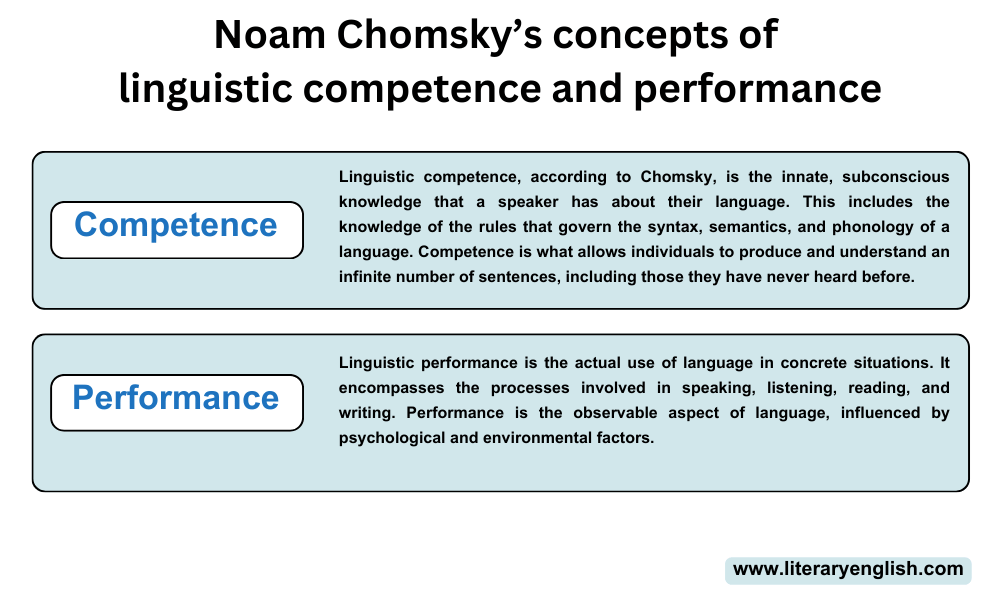Competence is central to Chomsky’s theory of generative grammar, which seeks to describe the implicit knowledge that speakers have of their language. It supports the idea of a universal grammar that underlies all human languages, suggesting that linguistic ability is inherent in humans. While competence provides the theoretical foundation, performance shows how language is used in practice. Performance data (such as child language acquisition) can provide insights into the processes by which competence is developed.
Let’s study Noam Chomsky’s concepts of linguistic competence and performance, which are fundamental to his theory of generative grammar.
Competence
Linguistic competence, according to Chomsky, is the innate, subconscious knowledge that a speaker has about their language. This includes the knowledge of the rules that govern the syntax, semantics, and phonology of a language. Competence is what allows individuals to produce and understand an infinite number of sentences, including those they have never heard before.
Key Characteristics of Competence
- Competence is about the internal, mental representation of linguistic rules.
- It forms the basis of Chomsky’s concept of generative grammar, which is a set of rules that can generate all possible sentences in a language.
- Chomsky proposed that all humans are born with an innate linguistic capability called Universal Grammar, which underlies the competence in any natural language.
- Competence is often discussed in terms of an “ideal speaker-listener” in a completely homogeneous speech community, unaffected by external factors.
Example: A native English speaker knows that “The boy loves the girl” and “The girl loves the boy” are both grammatical sentences with different meanings. This knowledge is part of their linguistic competence.
Performance
Linguistic performance is the actual use of language in concrete situations. It encompasses the processes involved in speaking, listening, reading, and writing. Performance is the observable aspect of language, influenced by psychological and environmental factors.
Key Characteristics of Performance
- Unlike competence, which is an internal construct, performance can be observed and measured.
- Factors such as memory limitations, distractions, attention, and social context can influence performance.
- Performance includes the errors and irregularities that occur during language use, which do not reflect a person’s true linguistic competence.
Example: When someone says, “I goed to the store” instead of “I went to the store” due to a slip of the tongue or a lapse in concentration, this mistake is part of their performance, not their competence.
Key Differences Between Competence and Performance
- Competence is abstract, idealized, and concerned with the mental representation of linguistic knowledge. While performance is concrete, observable, and concerned with the actual use of language in real-life situations.
- Competence focuses on what people know about their language. On the other hand, performance focuses on how people use their language.
- Competence assumes perfect knowledge of language, without errors. While, performance includes all errors and inconsistencies that occur during language use.
Conclusion
Chomsky’s distinction between competence and performance highlights the difference between knowing a language and using it. Competence refers to the mental knowledge of language, while performance refers to the actual use of language in real situations. This distinction is crucial for understanding the nature of linguistic knowledge and the goals of linguistic theory, which aims to model the underlying structure of language (competence) rather than the variable and often imperfect manifestations of language use (performance).
You might be interested in…
- What is Linguistics?
- Branches of Linguistics
- Synchronic Linguistics vs. Diachronic Linguistics
- Relationship Between Linguistics and Other Social Sciences
- Key Characteristics of Language | Human Language
- Human Language vs. Animal Communication
- Causes of Language Change | Types of Language Change
- Linguistics and Applied linguistics | Relationship
- Linguistics Functions
- The Concept of Langue and Parole by Saussure
- Applications of Linguistics
- Career of a Linguist
